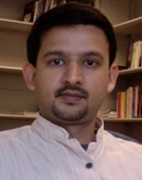Aswin Punathambekar

Politics after YouTube: Satire and democratic politics in digital India
This presentation is concerned with understanding how digital media have re-made Indian public culture. More specifically, I aim to explore how digital and mobile media forms, creative practices, and modes of circulation have re-made the cultural foundations of democratic politics in India. And to do so, I will focus on the 2014 national elections and on satire as a crucial narrative and communicative form for thinking and caring about politics and citizenship. In an era marked by the relentless corporate makeover of news media and a concomitant decline in public trust in journalism, satirical videos that took on political figures during the 2014 election campaign season offered a strikingly different and immensely popular mode of engagement with the political. Situating online satire within a vibrant field of everyday digital media production that marks contemporary Indian public culture, I will examine how satirical videos became part of an intricate, networked, yet comprehensible inter-textual field that linked the 2014 elections to long-standing political issues and debates around caste, class, gender and sexuality, and religious nationalism.
Biography
Aswin Punathambekar is an Associate Professor in the Department of Communication Studies at the University of Michigan, Ann Arbor. He is the author of From Bombay to Bollywood: The Making of a Global Media Industry (NYU Press, 2013), and co-editor of Global Bollywood (NYU Press, 2008) and Television at Large in South Asia (Routledge, 2013). He is now at work on his next book, provisionally titled Mobile Publics: Media Audiences in Digital India. He is also involved in an SSRC-funded collaborative project on “Media, Activism and the New Political: Inter-Asian Perspectives.”